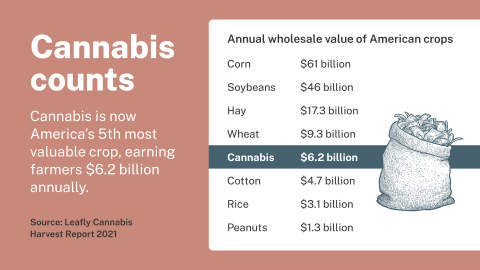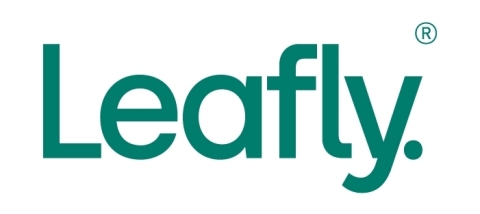New Leafly Report: Cannabis is America’s 5th Most Valuable Crop
New Leafly Report: Cannabis is America’s 5th Most Valuable Crop
America’s first national-level agricultural report on cannabis finds that legal cannabis supports more than 13,042 American farms and is now worth more than cotton.
SEATTLE--(BUSINESS WIRE)--Leafly Holdings, Inc. (“Leafly”), one of the world’s leading cannabis discovery marketplaces and resources, today released its inaugural Cannabis Harvest Report—the first look at cannabis crop data, insights, and projections across the 11 states where Americans can currently purchase both adult-use and medical cannabis.
In partnership with Whitney Economics, Leafly’s investigative team gathered and analyzed crop data from the 11 states with operating legal adult-use and medical cannabis markets and found that cannabis has become a major agricultural commodity that supports thousands of American farmers and farm communities. Leafly found that cannabis crops in adult-use states now support 13,042 licensed farms in the aggregate. On an annual basis, those growers harvest 2,278 metric tons (5,022,990 pounds) of cannabis. That’s enough cannabis to roll more than 2 billion joints, or fill 57 Olympic-size swimming pools.
That makes cannabis the fifth most valuable crop in the United States. With a wholesale harvest value of $6.2 billion, America’s cannabis harvest ranks above cotton and below wheat, based on US Department of Agriculture data for 2020.
Corn $ 61 billion
Soybeans $ 46 billion
Hay $ 17.3 billion
Wheat $ 9.3 billion
Cannabis $ 6.2 billion
Cotton $ 4.7 billion
Rice $ 3.1 billion
Peanuts $ 1.3 billion
Key findings from the Leafly Cannabis Harvest Report:
- In the 11 legal adult-use US states, cannabis supports 13,042 licensed farms that annually harvest 2,278 metric tons of marijuana, or more than 5 million pounds of weed.
- In America’s 11 states operating adult-use and medical cannabis markets, the wholesale cannabis crop brings in $6.2 billion annually, ranking it as the fifth most valuable crop in the United States. Only corn, soybeans, hay, and wheat bring in more money to American farmers.
- In each of the 11 states with adult-use retail stores operating, cannabis ranks no lower than 5th in terms of agricultural crop value—often within two years of the first store opening.
- Legal cannabis is the single most valuable agricultural crop in Alaska, Colorado, Massachusetts, Nevada, and Oregon, but remains completely uncounted and ignored by state agriculture officials.
- In Alaska, the state’s cannabis crop is worth more than twice as much as all other agricultural products combined.
“The Leafly Cannabis Harvest Report is an unprecedented national accounting of cannabis as a crop—and what we found was astounding,” said David Downs, the report’s lead author and Leafly’s California Bureau Chief. “America’s adult-use wholesale cannabis crop returned a mind-boggling $6.175 billion to farmers last year, ranking it as the 5th most valuable crop in the United States. Yet, due to federal prohibition, America does not treat cannabis farmers like farmers. They are subject to more state and federal taxes, regulations, and stigma than any other type of farmer. These barriers hurt small legacy farmers the most. This plant is helping generate wealth, employment, and community investment around the country, and our legislators need to recognize the opportunity cannabis presents for Americans—today.”
Leafly has been gathering cannabis employment and sales data since 2015 with its annual Jobs Report, filling a crucial information gap created by a lack of data collection from the US Department of Labor, which does not count cannabis jobs due to federal prohibition. Similarly, the US Department of Agriculture refuses to account for cannabis crops, and excludes cannabis farmers from all of its programs, due to cannabis’ outdated status as a federal Schedule I drug.
To complement and add depth to the 2021 Cannabis Harvest Report, Leafly interviewed more than 20 farmers in legal states across the country. They lend a human voice to the story in the data.
“My company LOWD has become one of Oregon’s premiere grow operations—showing that cannabis is helping build generational wealth and opportunity for all,” said Jesce Horton, a professional cannabis cultivator who’s the founder and CEO of Love Our Weed Daily (LOWD). “Black folks in particular have disproportionately felt the effects of harmful cannabis policy for far too long,” Horton added. “It brings me enormous pride to cultivate and grow this plant and instead show how it can help heal and bring prosperity to our communities.”
Methodology
Leafly’s investigative team, working in partnership with Whitney Economics, examined the 11 states where adult-use and medical cannabis are currently available for purchase. We counted only officially state-licensed cannabis farms. Leafly followed the USDA's approach, ascertaining production amounts for the most recent 12-month reporting period in each state, and multiplying that production by wholesale prices in each state to arrive at the crop’s value. Additional information on our methodology can be found on page 15 of the report.
To read the report in full, visit https://www.leafly.com/news/industry/cannabis-harvest-report-2021.
ABOUT LEAFLY
Cannabis discovery marketplace Leafly aims to help more than 125 million people discover cannabis this year. Our powerful ecommerce tools help shoppers make informed purchase decisions and empower cannabis businesses to attract and retain loyal customers through advertising and technology services. Learn more at Leafly.com or download the Leafly mobile app through Apple’s App Store or Google Play.
Cautionary Note Regarding Forward Looking Statements
This document includes “forward-looking statements” (as defined in the Private Securities Litigation Reform Act of 1995). Leafly’s actual results may differ from its expectations, estimates and projections and consequently, you should not place undue reliance on these forward-looking statements as predictions of future events. These forward-looking statements generally are identified by the words “aspire,” “expect,” “estimate,” “project,” “budget,” “forecast,” “anticipate,” “intend,” “plan,” “may,” “will,” “will be,” “will continue,” “will likely result,” “could,” “should,” “believe(s),” “predicts,” “potential,” “continue,” “future,” “opportunity,” “strategy,” and similar expressions are intended to identify such forward-looking statements.
These forward-looking statements are not guarantees of future performance, conditions or results, and involve a number of known and unknown risks, uncertainties, assumptions and other important factors, many of which are outside Leafly management’s control, that could cause actual results to differ materially from the results discussed in the forward-looking statements.
Leafly cautions readers not to place undue reliance upon any forward-looking statements, which speak only as of the date made. Leafly does not undertake or accept any obligation or undertaking to release publicly any updates or revisions to any forward-looking statements to reflect any change in its expectations or any change in events, conditions or circumstances on which any such statement is based.
Contacts
Laura Morarity
pr@leafly.com

